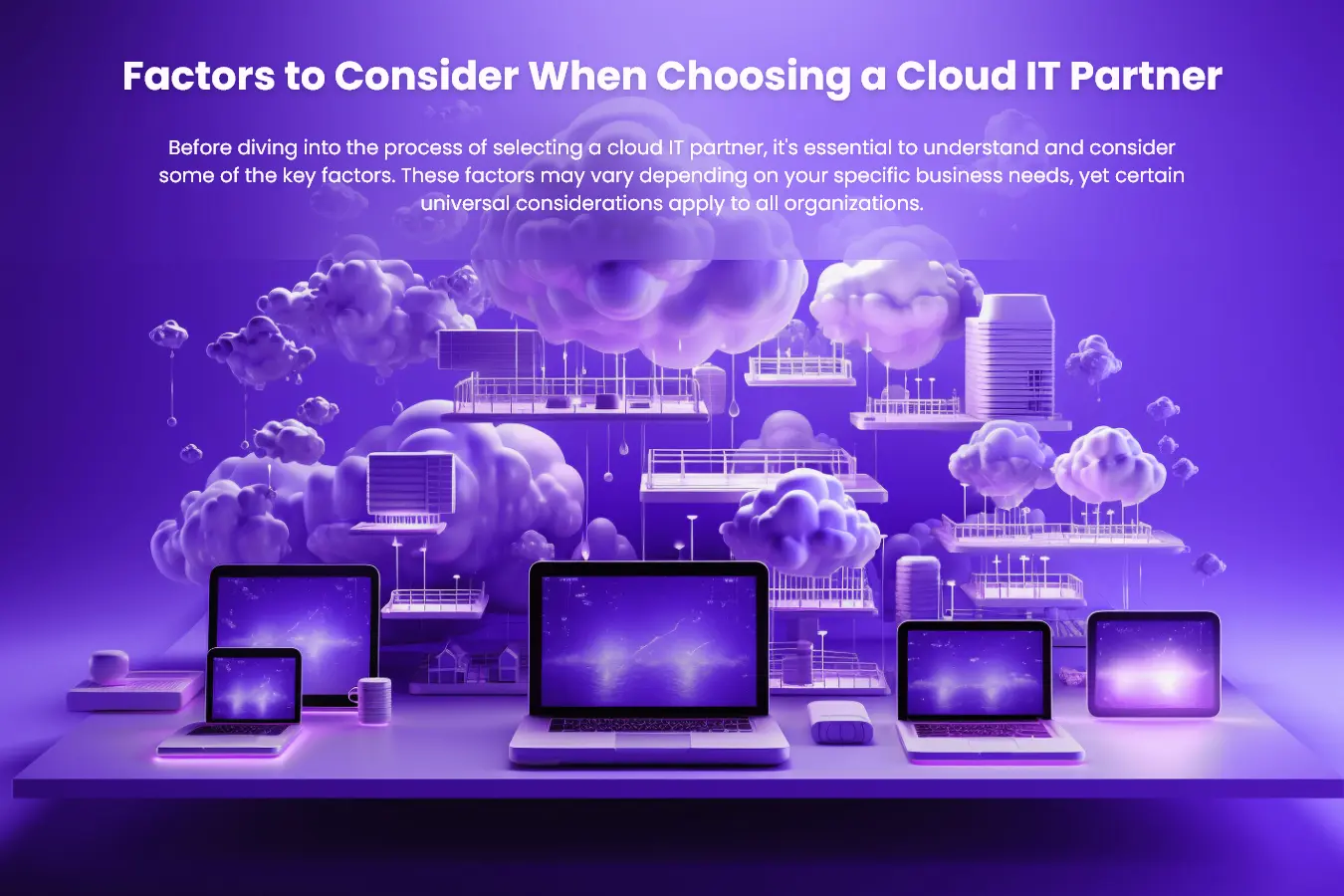
Introduction
For surviving and staying ahead of the curve in this digital era, the cloud has become an essential tool for managing IT infrastructure. The incredible scalability, flexibility, and security of the cloud have revolutionized the way of storing, accessing, and sharing information. Whether a small business or a large organization, staying connected or reaching huge masses of audiences or customers, the cloud has a pivotal role to play today.
Benefits of Choosing the Right Cloud IT Partner
Partnering with a cloud IT service provider offers many advantages:
- Offloads the burden of managing your IT infrastructure, freeing up valuable time and resources.
- Expertise in handling infrastructure setup, maintenance, data backups, and security.
- Provides access to state-of-the-art technology and infrastructure without the need for costly upgrades.
- Allows quick and easy scaling of resources as your business grows.
- Offers flexible pricing models, ensuring you only pay for what you need.
- Overall, cloud IT services are a cost-effective choice.
Factors to Consider When Choosing a Cloud IT Partner

1. Understanding Different Types of Cloud Service Providers
Cloud service providers come in various shapes and sizes, each offering a unique set of services and capabilities. The three main types of cloud service providers are Infrastructure-as-a-Service (IaaS), Platform-as-a-Service (PaaS), and Software-as-a-Service (SaaS).
– IaaS providers offer the foundational building blocks for your cloud environment, such as virtual machines, storage, and networking.
– PaaS providers go a step further and provide a platform on which you can develop, test, and deploy applications.
– SaaS providers offer complete software solutions that you can use directly, without the need for any infrastructure setup.
Understanding the differences between these types of providers is crucial in determining which one is the best fit for your business requirements.
2. Assessing the Needs of Your Business
– Before you can choose a cloud IT partner, you must have a clear understanding of your business’s IT needs. Start by identifying the specific goals and objectives you want to achieve with cloud technology. Consider factors such as the size of your organization, the industry you operate in, and any compliance or regulatory requirements you need to adhere to.
– Once you have a clear picture of your needs, you can assess potential cloud IT partners based on their ability to meet those requirements. Look for cloud solution providers that have experience working with businesses like yours and who offer the specific services and features you need.
3. Evaluating the Reputation and Experience of Potential Cloud IT Partners
– When entrusting your IT infrastructure to a third-party provider, it’s crucial to ensure they have a solid reputation and extensive experience in the industry. Look for providers with a proven track record of delivering high-quality services and who have worked with businesses like yours.
– Reading customer reviews and testimonials can provide valuable insights into the experiences of other businesses who have partnered with the provider. Additionally, consider reaching out to industry peers for recommendations and referrals.
4. Comparing Pricing and Service Offerings
– While cost should never be the sole determining factor, it is an essential consideration when choosing a cloud IT partner. Different providers offer various pricing models, so it’s crucial to compare and evaluate the costs associated with each.
– When comparing pricing, consider factors such as the upfront costs, ongoing maintenance fees, and any additional charges for data transfers or storage. Additionally, assess the provider’s SLA (Service Level Agreement) to ensure they offer the level of service and support that meets your business’s requirements.
– It’s also important to consider the range of services and features offered by each provider. Some may specialize in specific industries or offer solutions tailored to business needs. By thoroughly evaluating the service offerings, you can ensure that the provider aligns with your long-term goals and requirements.
5. Ensuring Data Security and Compliance
– Data security is of paramount importance when entrusting your business’s information to a cloud IT partner. Ensure that the provider has robust security measures in place to protect your data from unauthorized access, data breaches, and other security threats.
– Additionally, consider any compliance or regulatory requirements that your business must adhere to. Certain industries, such as healthcare or finance, have specific data privacy and security regulations that must be met. Ensure that the cloud IT partner has experience working with businesses in your industry and can provide the necessary compliance certifications.
6. The Importance of Scalability and Flexibility
– As your business grows and evolves, your IT infrastructure needs will change. It’s essential to choose a cloud IT partner that can scale your business and provide the necessary flexibility.
– Scalability refers to the provider’s ability to accommodate your growing resource requirements without disruption or downtime. Flexibility, on the other hand, refers to the ability to easily adjust your resources up or down as needed, without incurring excessive costs or complications.
– Partnering with a provider that offers both scalability and flexibility ensures that your IT infrastructure can adapt to your changing business needs, allowing for seamless growth and expansion.
7. Support and Customer Service Considerations
– A responsive and knowledgeable support team is crucial when it comes to managing your cloud IT environment. Look for a provider that offers 24/7 support and has a reputation for excellent customer service.
– Consider the provider’s communication channels and response times. Do they offer phone support, live chat, or email? How quickly do they respond to inquiries or support tickets? Additionally, evaluate the provider’s knowledge base and documentation to ensure that you have access to the resources you need to troubleshoot issues or learn new features.
Making the Final Decision: Choosing the Right Cloud IT Partner
After carefully considering all the factors outlined in this guide, it’s time to make your final decision. Consider your business needs, the reputation and experience of potential partners, the pricing and service offerings, and the level of support and customer service provided.
Remember, choosing the right cloud IT partner is not a one-size-fits-all decision. Each business has unique requirements and objectives, so take the time to thoroughly evaluate each potential partner to ensure the best fit for your organization.
Conclusion
Choosing the perfect cloud consulting partner is a critical decision that can significantly impact the success of your business. By following the comprehensive guide outlined in this article, you will be equipped with the knowledge and tools necessary to find the right fit for your organization.
Remember, the process of choosing a cloud consulting partner should not be rushed. Take the time to thoroughly evaluate each potential provider and consider factors such as reputation, experience, pricing, security, scalability, and customer service. By doing so, you will be well on your way to finding a trusted cloud IT partner that will support your business’s growth and success.
Ready to take the next step in your cloud IT journey? Get connected with Aptly Tech for all your cloud-related services.


